
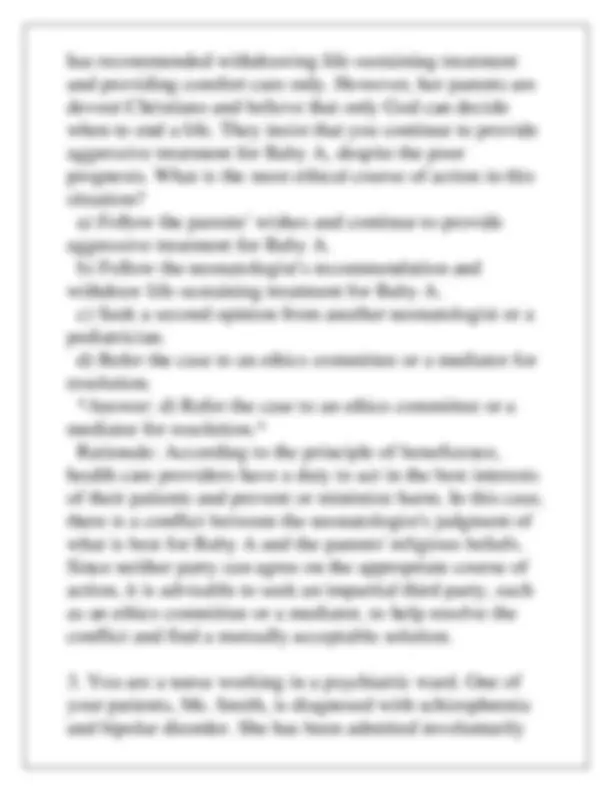
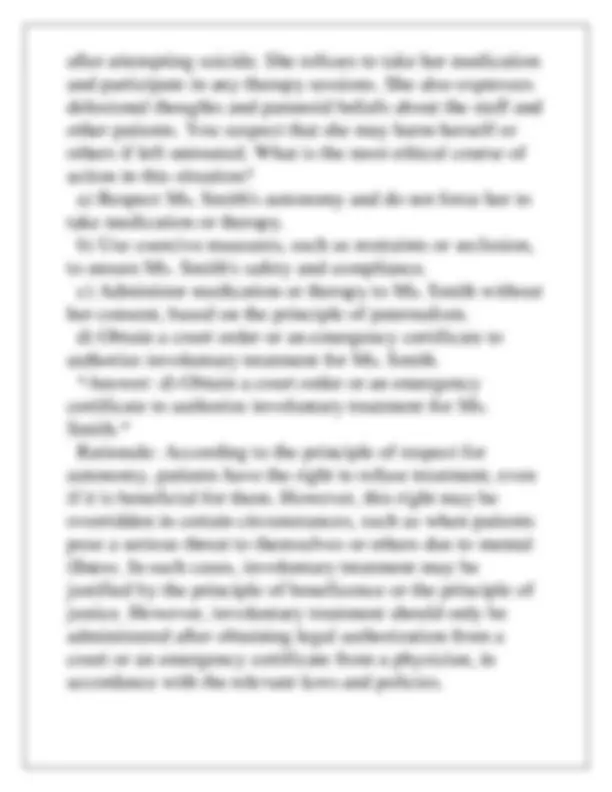
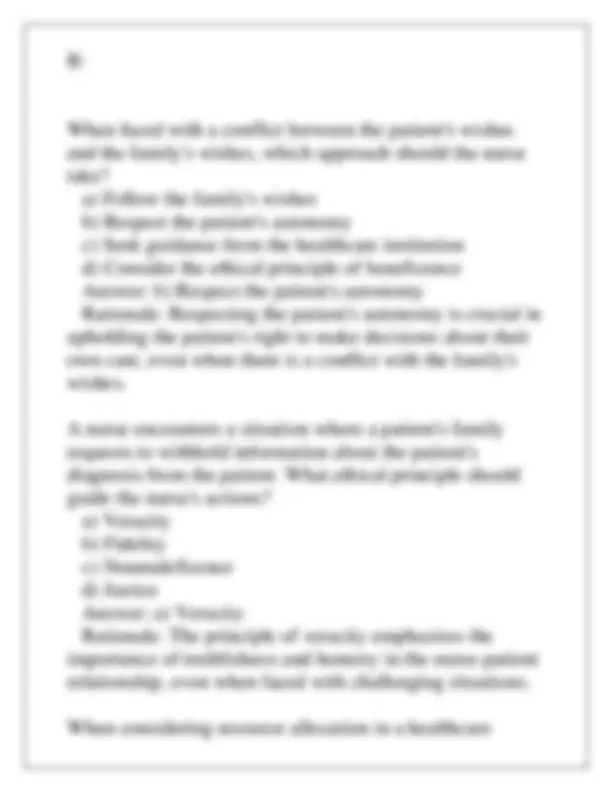
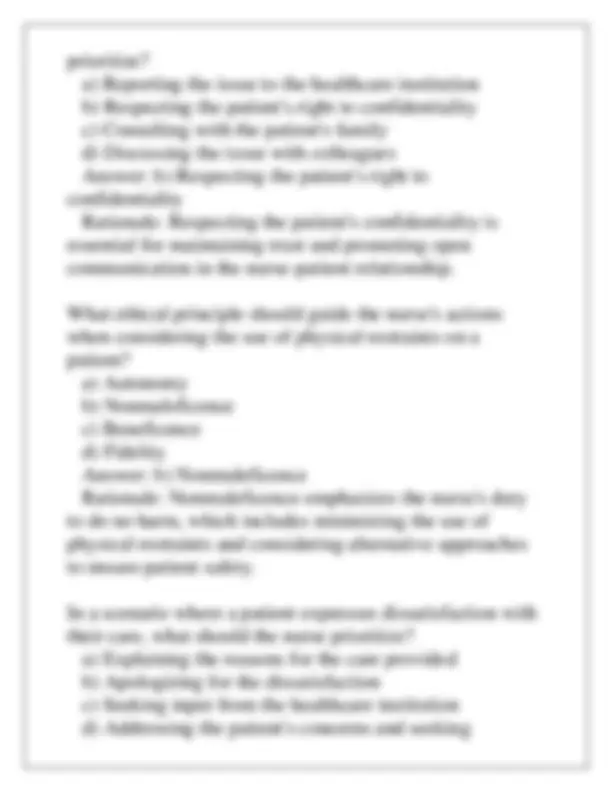
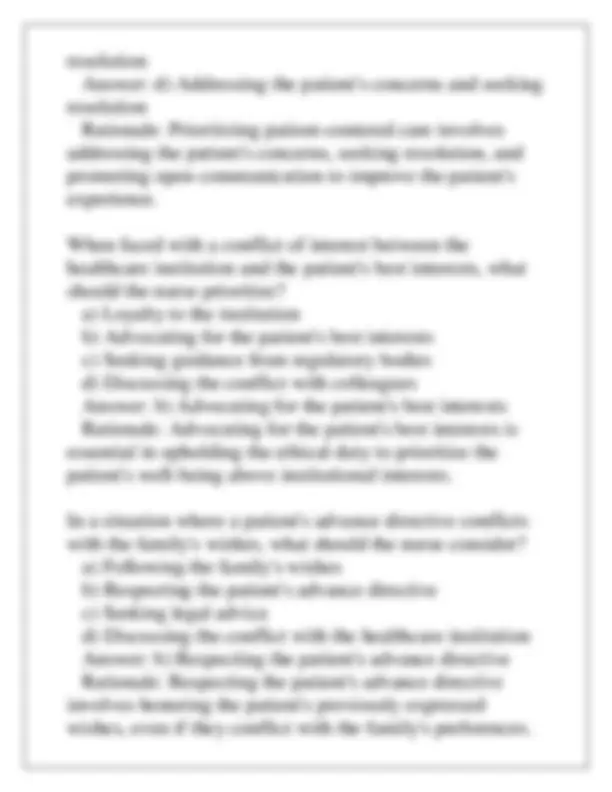
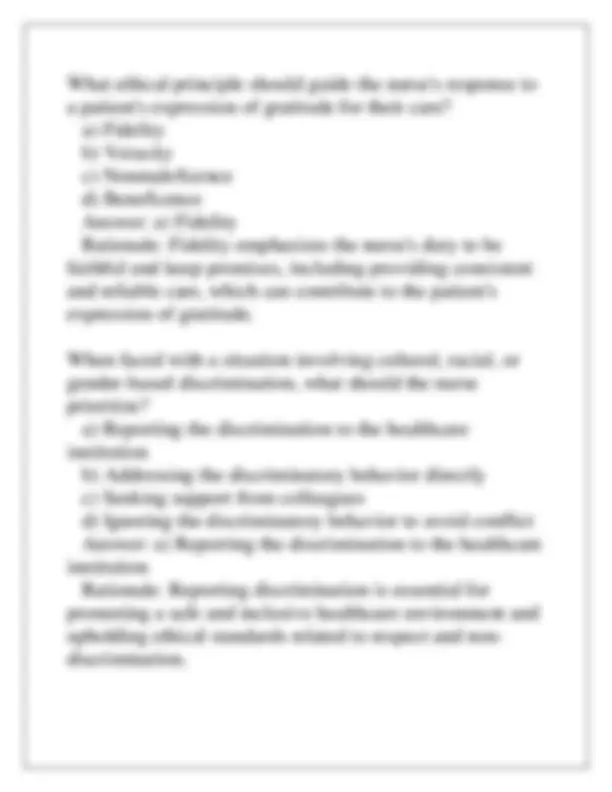
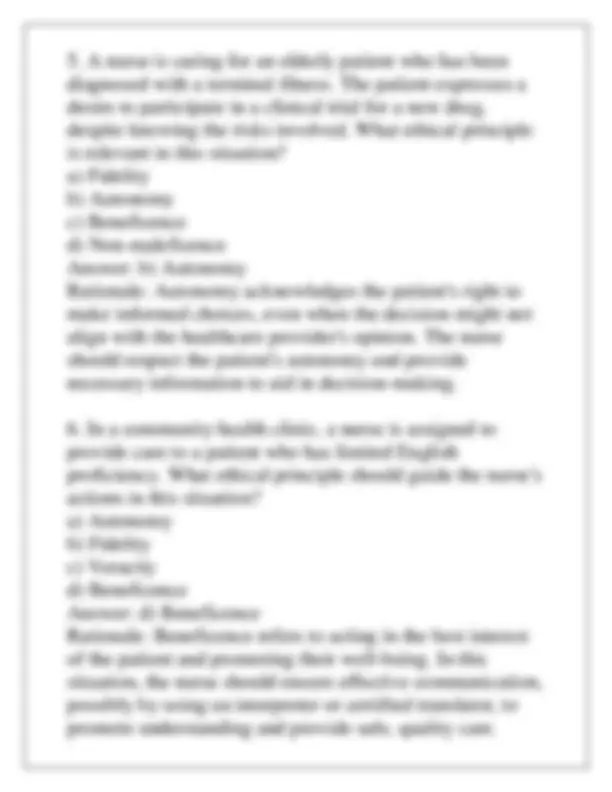
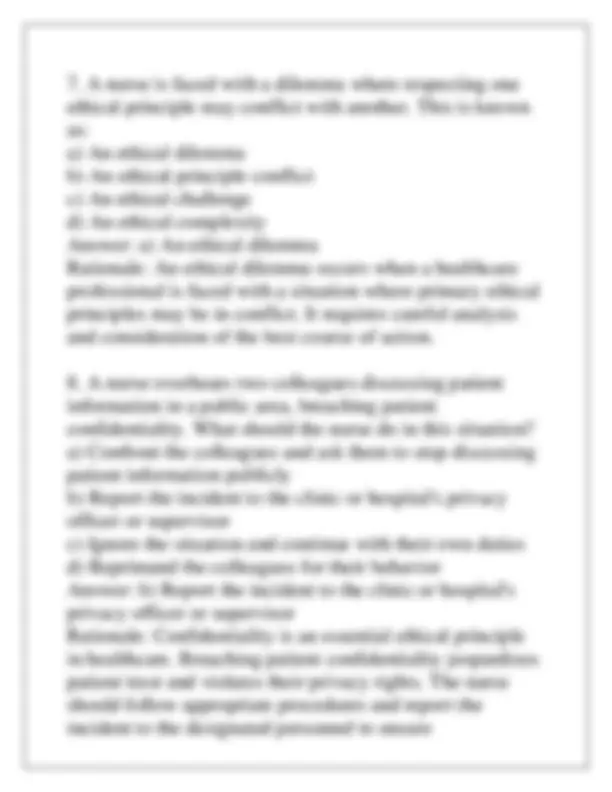
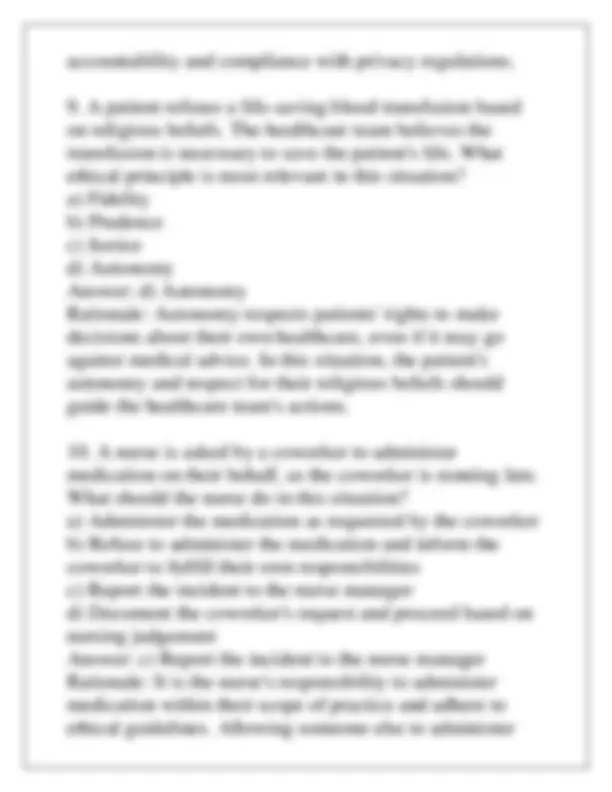
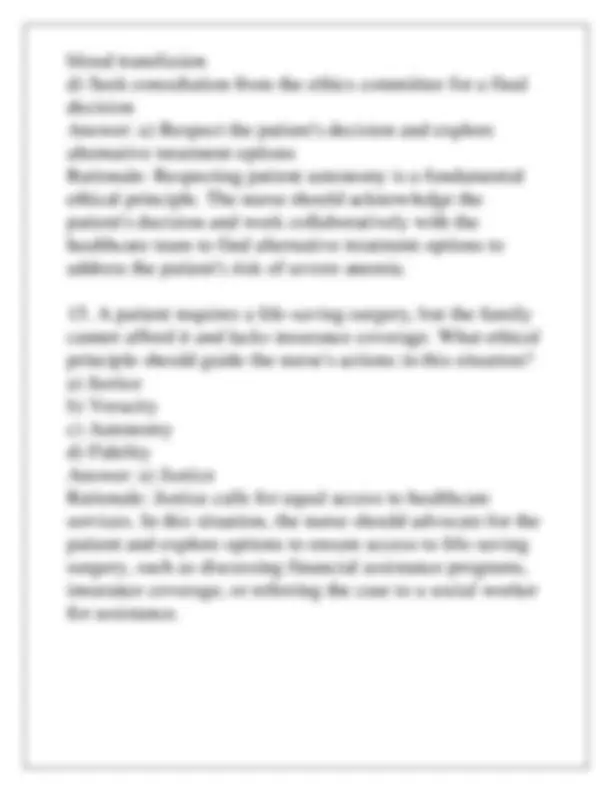


Study with the several resources on Docsity

Earn points by helping other students or get them with a premium plan


Prepare for your exams
Study with the several resources on Docsity

Earn points to download
Earn points by helping other students or get them with a premium plan
Community
Ask the community for help and clear up your study doubts
Discover the best universities in your country according to Docsity users
Free resources
Download our free guides on studying techniques, anxiety management strategies, and thesis advice from Docsity tutors
HSAD 210 HEALTH CARE ETHICS EXAM Q & A WITH RATIONALES 2024HSAD 210 HEALTH CARE ETHICS EXAM Q & A WITH RATIONALES 2024
Typology: Exams
1 / 18

This page cannot be seen from the preview
Don't miss anything!











after attempting suicide. She refuses to take her medication and participate in any therapy sessions. She also expresses delusional thoughts and paranoid beliefs about the staff and other patients. You suspect that she may harm herself or others if left untreated. What is the most ethical course of action in this situation? a) Respect Ms. Smith's autonomy and do not force her to take medication or therapy. b) Use coercive measures, such as restraints or seclusion, to ensure Ms. Smith's safety and compliance. c) Administer medication or therapy to Ms. Smith without her consent, based on the principle of paternalism. d) Obtain a court order or an emergency certificate to authorize involuntary treatment for Ms. Smith. Answer: d) Obtain a court order or an emergency certificate to authorize involuntary treatment for Ms. Smith. Rationale: According to the principle of respect for autonomy, patients have the right to refuse treatment, even if it is beneficial for them. However, this right may be overridden in certain circumstances, such as when patients pose a serious threat to themselves or others due to mental illness. In such cases, involuntary treatment may be justified by the principle of beneficence or the principle of justice. However, involuntary treatment should only be administered after obtaining legal authorization from a court or an emergency certificate from a physician, in accordance with the relevant laws and policies.
When faced with a conflict between the patient's wishes and the family's wishes, which approach should the nurse take? a) Follow the family's wishes b) Respect the patient's autonomy c) Seek guidance from the healthcare institution d) Consider the ethical principle of beneficence Answer: b) Respect the patient's autonomy Rationale: Respecting the patient's autonomy is crucial in upholding the patient's right to make decisions about their own care, even when there is a conflict with the family's wishes. A nurse encounters a situation where a patient's family requests to withhold information about the patient's diagnosis from the patient. What ethical principle should guide the nurse's actions? a) Veracity b) Fidelity c) Nonmaleficence d) Justice Answer: a) Veracity Rationale: The principle of veracity emphasizes the importance of truthfulness and honesty in the nurse-patient relationship, even when faced with challenging situations. When considering resource allocation in a healthcare
Rationale: Reporting an impaired colleague is essential for patient safety and upholding professional ethical standards in healthcare. What ethical principle should guide the nurse when obtaining informed consent from a patient for a medical procedure? a) Beneficence b) Nonmaleficence c) Autonomy d) Fidelity Answer: c) Autonomy Rationale: Respecting the patient's autonomy involves obtaining informed consent, ensuring the patient has the necessary information to make a decision about their care. In a situation where a patient's cultural beliefs conflict with the standard medical treatment, what should the nurse prioritize? a) Cultural competence b) Following institutional protocols c) Explaining the superiority of medical treatments d) Seeking advice from the patient's family Answer: a) Cultural competence Rationale: Cultural competence involves understanding and respecting the patient's cultural beliefs and practices while providing culturally sensitive care. When faced with a patient's request for confidentiality regarding a sensitive issue, what should the nurse
prioritize? a) Reporting the issue to the healthcare institution b) Respecting the patient's right to confidentiality c) Consulting with the patient's family d) Discussing the issue with colleagues Answer: b) Respecting the patient's right to confidentiality Rationale: Respecting the patient's confidentiality is essential for maintaining trust and promoting open communication in the nurse-patient relationship. What ethical principle should guide the nurse's actions when considering the use of physical restraints on a patient? a) Autonomy b) Nonmaleficence c) Beneficence d) Fidelity Answer: b) Nonmaleficence Rationale: Nonmaleficence emphasizes the nurse's duty to do no harm, which includes minimizing the use of physical restraints and considering alternative approaches to ensure patient safety. In a scenario where a patient expresses dissatisfaction with their care, what should the nurse prioritize? a) Explaining the reasons for the care provided b) Apologizing for the dissatisfaction c) Seeking input from the healthcare institution d) Addressing the patient's concerns and seeking
What ethical principle should guide the nurse's response to a patient's expression of gratitude for their care? a) Fidelity b) Veracity c) Nonmaleficence d) Beneficence Answer: a) Fidelity Rationale: Fidelity emphasizes the nurse's duty to be faithful and keep promises, including providing consistent and reliable care, which can contribute to the patient's expression of gratitude. When faced with a situation involving cultural, racial, or gender-based discrimination, what should the nurse prioritize? a) Reporting the discrimination to the healthcare institution b) Addressing the discriminatory behavior directly c) Seeking support from colleagues d) Ignoring the discriminatory behavior to avoid conflict Answer: a) Reporting the discrimination to the healthcare institution Rationale: Reporting discrimination is essential for promoting a safe and inclusive healthcare environment and upholding ethical standards related to respect and non- discrimination.
medication on behalf of another healthcare professional can compromise patient safety and violate ethical standards. The incident should be reported to appropriate authority figures.
Answer: c) The relevant ethical principles and codes of conduct Rationale: When faced with an ethical dilemma, healthcare professionals should consider the relevant ethical principles and codes of conduct. These guidelines provide a framework for decision-making that upholds the well-being of patients and encourages ethical practice.